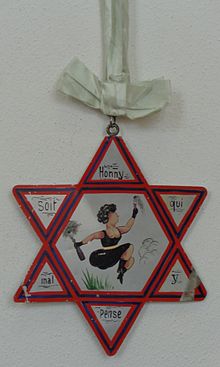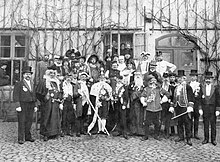Bützow Court Day
The Bützower Hoftag was a carnival game by students from the University of Rostock . In Bützow verulkte it Wilhelmine African pomp.
history

As a counter-foundation to the University of Rostock, the University of Bützow, founded by Duke Friedrich and closed after his death, existed from 1760 to 1789 . In remembrance of this and probably inspired by the beer state in Lichtenhain (Jena) , the swamp chickens in Rostock came up with the idea of a "courtyard festival" in Bützow . The first rose at the end of February 1895 with a "Chalifen" in Bützow. After an interlude in Schwerin , they returned to Bützow in 1898 with an "Kaiser". The popular festival took place there every year in February until 1914. The last emperor of Bützow was Karl Haedenkamp .
Preparations
In the Evert wine shop, the moorhens chose the emperor. Three so-called small court days at intervals of one week served to prepare for the festival. On them the loyal followers of SM were made familiar with court customs. The dress code was meticulous. The medals acquired on earlier court days were brought out and the grandees dressed up with wigs and powder . Landauer brought the emperor's four-in-hand with the Chancellor and the master of ceremonies from the hop market to the Rostock train station, with the “lively participation of the ladies” . Probably frozen through from the open carriage ride in February, “SM gave a gracious address to the remaining population of his loyal seaside town of Rostock; the Chancellor gave a cheer for the Kaiser ”. The Friedrich-Franz-Eisenbahn provided a saloon car that was attached to the express train to Hamburg.
Firmly
In the Bützow station , the railway administration kept track 1 free for reception. The (played) “mayor” handed over the city key. The drink of honor for the emperor was followed by a festive entry into the city. The Oberhofpikeur rode in front, always the house servant Friedrich from the Hotel Schlossstrasse. He was followed by the band in the cart and the herald, mostly an inactive in the cavalry . The throne wagon was also a cart or the truck of the paper mill. Adorned with a black-white-red flag and pine green, it was described by contemporary witnesses as "en pray uncultivated, aewersten bannig state". In front of the throne stood the emperor, imperial chancellor and master of ceremonies. The court society following behind threw oranges and pennies among the children. After a bumpy ride at the Bützow town hall , the emperor made a speech to his people and exhorted them to be unwaveringly loyal. Then we went on foot to the “Pfalz” , the run-down Hotel de Prusse (later King of Prussia ). After dark, the high school students gathered there to go with the emperor and court in a torchlight procession to the house of the real mayor. After the emperor had thanked him for his achievements and loyalty, they moved back to the Palatinate with some dignitaries. After the close-up , the farm table began - always ham with vegetables and potatoes, the table setting at 1.50 marks . Medal awards and higher ranks followed. Among the myriad Order of "home real" included fried herring and (as the highest) of the Order of the sprat eaten ; "For the sprat is the child of the deep, and humor dwells in the deep". The house order made of zinc was in great demand - "because it hung out of the neck of the wearer". The medals are kept in Bützow's Crooked House today .
Basic Law and Foreign Policy
In 1899 the “Basic State Law” was adopted. Written in German and French, it described the distribution of offices in the court and the course of the ceremony.
“The emperor is always called by the glorious name Jobst Huppupp; His titles are Chalif and Kaiser over Bützow, King in Güstrow, the Lande Biestow, Rostock and Katelbogen Archduke and Lord, Holy Father and Grand Cardinal, First Knight of the Order of the Wreathed Pig. He can also get a title and name as he likes. "
The absolute monarchy of the Emperor von Bützow had concluded an alliance with the Republic of Grunts zu Gehlsdorf . It was written in Low German and French:
"Wekker Swinegel wants what Emperor von Bützow wants, whom Lattenfritz should put in the club, that he can't do with me."
Offices
The names and titles are full of allusions . The photo from 1912 shows
- Jobst Huppupp DLXIII , Kaiser over Bützow
- Trunklieb, Duke of Latium , Arch Chancellor, Entrecôte Duc de Ragout-fin, Minister of the Interior
- Prince Pinkus , Minister of Finance
- Prince Jagow Dummersdorf , Minister of Police
- Tatterhand Prince of Heringsdorf and Ahlbeck , Imperial Bützowscher ambassador
- Caspar Graf von Vogeldunst , Lord Major of the capital and residence of Bützow
- Abraham Waldorf Freiherr von Astoria , Rector of the State University
- Lanius Graf von Schwiedt on bone cracking, personal physician SM, general physician in the army
- Eumaeus Graf Sauzahn , chief forest master
- Gaudeamus Freiherr von Götterfunken , Chamberlain
- Archibald Graf von Riesen-Steinbock , chief court interpreter
- August Reichsfreiherr in and out of the kennel , director of the Imperial Zoological Garden
- Joseph Böck Knight of the Golden Scissors , master tailor
- Perk-Eo Freiherr von Dreckhobel , cupbearer SM
- Benedikt Graf von Mascagni , General Music Director
- Urias Manasse Holofernes Freiherr von Persertod , Reichsschindermeister
- Twostep Freiherr von Liebenreich , Leibpage SM
- Schmoor von Küchenfett , farm trainer and head chef of the imperial court kitchen
- Bayrum de Quinine , Imperial Bützowsch court hairdresser
- Fearful beer of thirst for knowledge , fish master on the Oberwarnow
- Miracle von Mammon , bank director of the Reichsbank branch St. Pauli
- Nazi von Pickelhuber , Bräumister and chairman of the association against fraudulent beer pouring
- Friedrich , Oberhofpiqueur
review
“One can be sure that there are people in the country who only use the angry word 'nonsense' for all of this. One can never argue about it with people who do not know anything about the sentence: "There is a child hidden in a real man: he wants to play." On the other hand, there are probably enough people who enjoy this jumping joke, this plentiful one Opportunity for the humor and this distortion of a grandiose "dignity". And one thing can certainly be said to be safe from curmudgeons: a lazy and poor mind cannot invent such things and cannot waste itself so carelessly and freely.
Today the Kaiser von Bützow lives in exile. Times have been unfavorable for him since the war. First in economic terms. But otherwise: what misunderstandings there would be! One would resent the emperor for his existence in all camps; because you have never been as ready to snap as you are today. That's a bad sign. Healthy times are not sensitive. The Kaiser von Bützow is therefore in the background. "
See also
literature
- PJC: The Kaiser von Bützow - a student joke. In: Mecklenburgische Monatshefte 4 (1928), Heft 2, pp. 86-91
- Günter Camenz: Der Kaiser von Bützow , in: Güstrower Jahrbuch , Vol. 10 (2002), pp. 241–244. [1]
- Herbert Kater: The inactive and holiday associations of the Kösener SC Association . Einst und Jetzt , Vol. 16 (1971), p. 202. [2]
- Wolfgang Schmidtbauer: Bützow in old views , Vol. 1, European Library, Zaltbommel 1995, p. 51. ISBN 978-90-288-6003-2 .
Web links
Remarks
- ↑ in the same way: Which piggy pee on the emperor's car gets which on A. until he can no longer sit.
- ↑ DLXIII = 563 is perhaps an allusion to Chindaswinth
- ↑ see Ahlbeck (Heringsdorf)
- ↑ see shotgun # bird haze
- ↑ Lanius is also a butcher or an executioner
- ↑ see Eumaios , Sauzahn
- ↑ see Gaudeamus igitur , Götterfunken
- ↑ kennel = enclosure
- ↑ see Max and Moritz
- ↑ Perk-Eo refers to the Low German word Perk (pimple) and to Perkeo .
- ↑ see Pietro Mascagni
- ↑ see Uriah , Manasseh (King) , Holofernes
- ↑ see Two Step (dance)
- ↑ on the verge of lese majesty, but apt.
- ↑ see Braising and Traiteur
- ↑ see Bay rum , quinine
- ↑ see Mirakel , Mammon , St. Pauli
- ↑ "Nazi" was originally a nickname of Ignaz, a common name in Bavaria and Austria
- ↑ see also Association against fraudulent pouring
- ↑ see Pikör
- ^ The author PJC could not be identified in the state bibliography, state library Mecklenburg-Western Pomerania.

